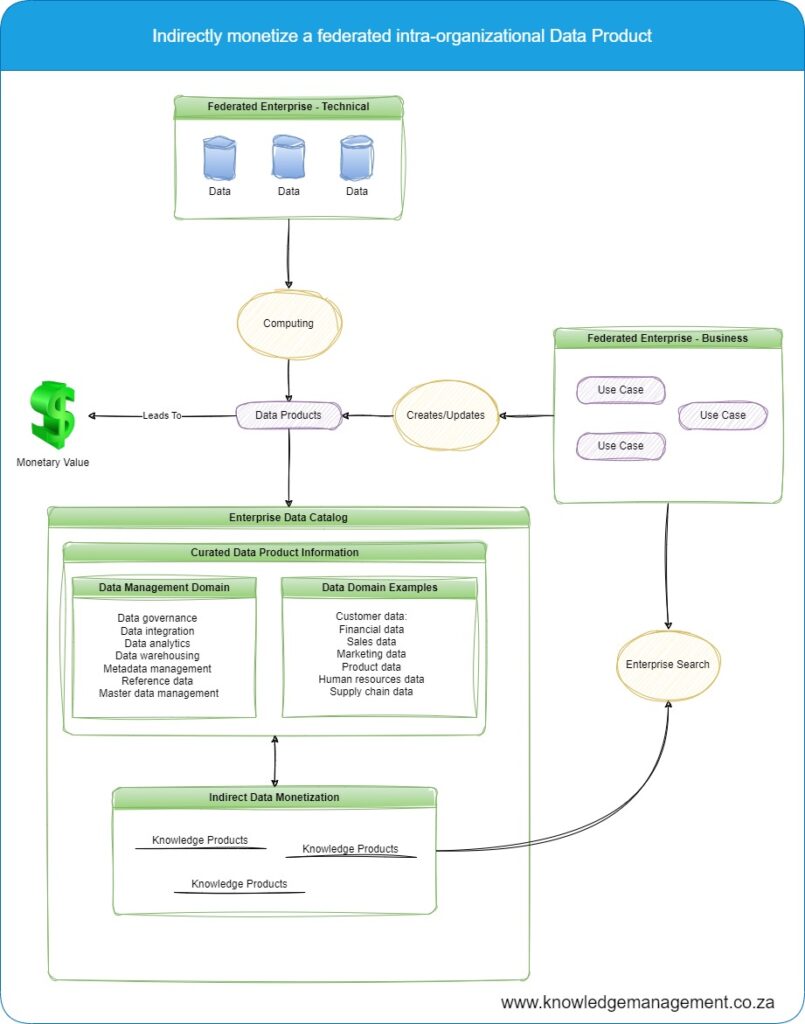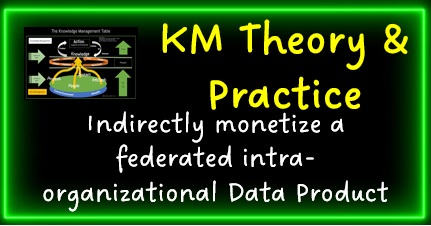Opinion: Indirectly monetize a federated intra-organizational
Data Product
|
What is a “Data Product”? Harvard Business
Review: A Better Way to Put Your Data to Work [1]: A data product
delivers a high-quality, ready-to-use set of data that people across an
organization can easily access and apply to different business challenges. "Monetize" refers to the process of
generating revenue from something. |
What
is the purpose of a Data Product? When
researching this topic, you will immediately see various definitions with
technology solutions attached to “Data Products”, such as Data Mesh, Data
Fabric or Web3.
Harvard
Business Review [1] (In the article: “Traditional Data consumption Versus the
Data Product Model”) explains that for the traditional approach; “Use Case
Teams identify the data they need from source system and create data sets and
feeds only for their particular solutions.”, whereas for the data product
approach, “Use Case Teams build solutions by leveraging standardized data
products and wiring technologies together following consumption archetype
patterns, which reduces work, simplifies the data architecture, and decrease
the time it takes to realize value.” [1] For example, a Data Product
utilizes sources such as Data Warehouses, Data Lakes or Operational Data Stores
as its primary input and applies various tools or applications to generate
business value. It is essential that the data is readily accessible to all
members of the organization.[1] This implies that computing is necessary
to create a Data Product.
Immediately
I am considering some important factors such as domains, centralized versus
decentralized approaches, interoperability, data governance, data literacy, and
data culture for an organization, which include aspects of people, process,
systems, and technology aka Data Management.
In
my opinion, data products could be grouped according to domain and/or data
domain functionality. While a domain refers to a broader field of knowledge
(for example, in data management: database management, data governance, data
integration, data analytics, data warehousing, metadata management, master data
management, etc.), a data domain is more specific and refers to the type of
data value for a particular data attribute or a logical grouping of data that
shares a common meaning or purpose (for example: Address or Customer). This
also adds to the confusion of the meaning for “Data Product” and “Data as a
Product”. To clarify this, "Data Product" is a broad term that refers
to any product (Consumption archetypes [1]) that uses data, while "Data as
a Product" is a specific business model in which data is the primary
product being sold.
.
|
What is “Data monetization”? Gartner: Data
Monetization refers to the process of using data to obtain quantifiable
economic benefit [2] Internal or indirect methods include using data to
make measurable business performance improvements and inform decisions.
External or direct methods include data sharing to gain beneficial terms or
conditions from business partners, information bartering, selling data
outright (via a data broker or independently), or offering information
products and services (for example, including information as a value-added
component of an existing offering). |
|
What is “indirectly monetize”? Forbes:
Data Monetization: New Value Streams You Need Right Now [3]: Data monetization methods are classified into two broad groups: direct and indirect monetization. With direct
monetization data generates explicitly attributable economic benefits. With indirect monetization data contributes to economic benefits more obliquely. Direct data monetization generally is in the form of
a transaction, whereas indirect data monetization involves affecting one or
more of your own business processes. Indirect data monetization methods
include many of your organization already is leveraging data, such as:
|
I found this article from McKinsey & Company: “How to unlock the full value of data? Manage it like a product.” [4] The article is based on manufacturing where the benefits of this approach can be significant: “McKinsey & Company” [4]
- New business use cases can be delivered as much as 90 percent faster.
- Total cost of ownership, including technology, development, and maintenance costs, can decline by 30 percent.
- The risk and data-governance burden can be reduced.
My
questions are: “Is it possible to indirectly monetize Data Management Data
Products within a Federated Organization?” and “How do you determine the
monetary or indirect benefits of indirect Data Management Data Product
monetization initiatives within a federated organization?"
Going back to the Academic Book of Knowledge, a thesis done by Jonna Fed (2017), Data Monetization – How an 0rganization can generate revenue with data? [5] states the following issues relate to data monetization:
- Ethics, data privacy and social networks
- Cultures and eligibility globally
- Ownership of data
When considering the practical implications of democratizing data, one challenge is that data owners in federated organizations may be hesitant to share their knowledge about the value they derive from their data. This is often due to the belief that since they pay to maintain the data, it belongs solely to them. A question such as: "What benefit does my department stand to gain by sharing our data with the entire organization?"
One way to overcome this issue, in my opinion (by leveraging Data Products) is to share information via a “Knowledge Product”. Technology should be shaped and influenced by business needs, rather than the other way around, technology is only the enabler to produce the required results. In this particular context, the term "knowledge product" denotes the capability to conduct an enterprise search within a data catalog, enabling the retrieval of information or insights related to the operations of other federated units and their respective data products within domains. The information shared within the knowledge product will only provide details on the successful implementation of business use cases. Now we are talking about Knowledge Management, not Information Management.

By showcasing what accomplishments other business
units have made, it can trigger moments of insight or realization. Commencing
negotiations can lead to both parties gaining mutual benefits from sharing a
data product, therefore, in my opinion, you have achieved indirectly monetizing Data Products within a federated intra-organization to gain monetary value.
If you have some experiences you would like to share,
or any feedback on this topic, please send an email to km@knowledgemanagement.co.za or
leave a comment.
[1] https://hbr.org/2022/07/a-better-way-to-put-your-data-to-work

